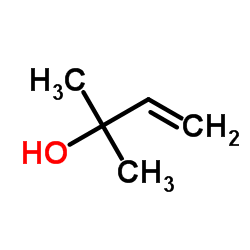2-甲基-3-丁烯-2-醇

2-甲基-3-丁烯-2-醇结构式

|
常用名 | 2-甲基-3-丁烯-2-醇 | 英文名 | 2-Methyl-3-buten-2-ol |
|---|---|---|---|---|
| CAS号 | 115-18-4 | 分子量 | 86.132 | |
| 密度 | 0.8±0.1 g/cm3 | 沸点 | 98.5±0.0 °C at 760 mmHg | |
| 分子式 | C5H10O | 熔点 | -43 °C | |
| MSDS | 中文版 美版 | 闪点 | 13.3±0.0 °C | |
| 符号 |


GHS02, GHS07 |
信号词 | Danger |
|
Kinetics and mechanism of chlorine-atom-initiated oxidation of allyl alcohol, 3-buten-2-ol, and 2-methyl-3-buten-2-ol.
J. Phys. Chem. A 114(12) , 4224-31, (2010) The gas-phase reactions of Cl atoms with allyl alcohol (k(1)), 3-buten-2-ol (k(2)), and 2-methyl-3-buten-2-ol (k(3)) at 296 +/- 2 K have been investigated using absolute and relative rate methods in 1-700 Torr of N(2) diluent. Absolute rate studies were perfo... |
|
|
Dose-dependent response and preliminary observations on attraction range of Ips typographus to pheromones at low release rates.
J. Chem. Ecol. 27(12) , 2425-35, (2001) Responses of the European spruce bark beetle, 1. typographus (Coleoptera: Scolytidae), to low release-rate pheromones were investigated in two experiments in a spruce forest at Wellin, southern Belgium. Dose-response of the beetle was first examined in a trap... |
|
|
The uptake of 2-methyl-3-buten-2-ol into aqueous mixed solutions of sulfuric acid and hydrogen peroxide.
Phys. Chem. Chem. Phys. 13(6) , 2069-75, (2011) Multiphase acid-catalyzed oxidation with hydrogen peroxide (H(2)O(2)) has been suggested recently to be a potential route to SOA formation from isoprene and its gas-phase oxidation products, the kinetics and chemical mechanism of this process have not been we... |
|
|
Biosynthesis of 2-methyl-3-buten-2-ol emitted from needles of Pinus ponderosa via the non-mevalonate DOXP/MEP pathway of isoprenoid formation.
Planta 213(2) , 323-6, (2001) The volatile hemiterpene 2-methyl-3-buten-2-ol (MBO) is emitted from the needles of several pine species from the Western United States and contributes to ozone formation in the atmosphere. It is synthesised enzymatically from dimethylallyl diphosphate (DMAPP... |
|
|
[The sedative-hypnotic action of hops. 4. Pharmacology of the hop substance 2-methyl-3-buten-2-ol].
Planta Med. 48(2) , 120-3, (1983)
|
|
|
Ion trap mass spectrometry affords advances in the analytical and atmospheric chemistry of 2-hydroxy-2-methylpropanal, a proposed photooxidation product of 2-methyl-3-buten-2-Ol.
J. Am. Soc. Mass Spectrom. 13(5) , 530-42, (2002) In the western United States, in areas where emissions of the biogenic hydrocarbon, 2-methyl-3-buten-2-ol (MBO) are high, MBO contributes significantly to the oxidative capacity of the atmosphere. Hydroxyl radical oxidation of MBO can play an important role i... |
|
|
[Detection of sedative-hypnotic active ingredients in hops. 5. Degradation of bitter acids to 2-methyl-3-buten-2-ol, a hop constituent with sedative-hypnotic activity].
Arch. Pharm. (Weinheim) 316(2) , 132-7, (1983)
|
|
|
Bacterial degradation of tert-amyl alcohol proceeds via hemiterpene 2-methyl-3-buten-2-ol by employing the tertiary alcohol desaturase function of the Rieske nonheme mononuclear iron oxygenase MdpJ.
J. Bacteriol. 194(5) , 972-81, (2012) Tertiary alcohols, such as tert-butyl alcohol (TBA) and tert-amyl alcohol (TAA) and higher homologues, are only slowly degraded microbially. The conversion of TBA seems to proceed via hydroxylation to 2-methylpropan-1,2-diol, which is further oxidized to 2-hy... |
|
|
Identification of compounds in mouse urine vapor by gas chromatography and mass spectrometry.
Mech. Ageing Dev. 13(2) , 177-84, (1980) Eighty compounds in normal mouse urine vapor are identified, 61 of which have not previously been reported in normal mouse urine. Two of the ten most strongly age-correlated substances in the mouse urine vapor are confirmed as 3-hydroxy-3-methylbutene and tra... |
|
|
Characterization of a Pseudomonas putida allylic alcohol dehydrogenase induced by growth on 2-methyl-3-buten-2-ol.
Appl. Environ. Microbiol. 65(6) , 2622-30, (1999) We have been working to develop an enzymatic assay for the alcohol 2-methyl-3-buten-2-ol (232-MB), which is produced and emitted by certain pines. To this end we have isolated the soil bacterium Pseudomonas putida MB-1, which uses 232-MB as a sole carbon sour... |